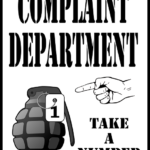
Image by Gordon Johnson from Pixabay
By Mark G. Auerbach
You may have recently seen headlines that Frontier Airlines, a low-cost or budget airline, had closed its customer service lines, telling its customers to communicate online, via email, or with chat bots. In interviews, they said that their customers preferred this means of communications; they didn’t say that eliminating a department saved them tons of money. NPR covered the story.
Now, I make most of my travel arrangements online. I shop online. I bank online. I’ve even “chatted” with bots. But, when something is complicated or goes wrong, I want the peace of mind knowing that I can talk with a real human being, who can problem solve outside of algorithms.
When people can’t reach a human in a company, it reinforces the idea that “we don’t care.” And negative feedback and complaints if handled correctly can convert an angry customer into a loyal patron. They can also provide invaluable information on how your product, service, and company is perceived. and adjust accordingly.
Train your staff
As you develop a policy to train your staff (and empower them) to solve problems, think back on some of the worst customer service you’ve personally experienced. Mine took place at a local hospital-affiliated doctor’s office. When I arrived to check-in, the receptionist was busy filing a broken nail and talking with her colleague about her previous evening’s bad date. Seeing that there were just minutes before my appointment, I apologize for interrupting, and asked to check-in. Without looking at me, she said, “Date of birth?” I replied with my name and date of birth. She said, “You’re not in the system.” I handed her a copy of the email confirmation for the appointment. She gave one of those loud “don’t interrupt me” sighs and said, “Go sit down. They’ll call you when they’re ready.” She continued chatting with her colleague. Fifteen minutes past my appointment time, I returned to ask her how long the way should be. She said, “We’ll call you. Now, don’t give me shade.”
When I finally saw the doctor, I complained, only to get the response, “We’re short-staffed these days.” It wasn’t satisfactory to me, so I “took my business” to another medical practice. I wrote a complaint to the hospital, since they’d referred me, only to get a form letter, “thank you for bringing your concerns to us.” It seems that my concerns could have been anything from a rude staff member to an issue in the parking garage. They just didn’t care.
Being skilled in addressing customer complaints is good for your company. You quickly learn if you’re doing something wrong, which gives you the opportunity to modify or correct the issue, before more people complain.
Listen
You have to be a good listener. Empathize and sympathize with the customer, whether they’re right or wrong. Document the facts about the complaint. Remember to thank them for taking the time to complain, and either solve their problem, or give them a timeline for when that problem will be solved. Thank them when the conversation ends and follow up with them.
You can learn a lot from a complaint. If you handle it well, you maintain a customer, and maybe that customer will share their positive experiences with someone else. If their complaint is valid, you may be able to correct a product or service, so you don’t lose other customers who are experiencing the same issue. (Only a small number of people actually complain; the rest walk away). And you can learn how to be more proactive in communicating with your customers.
Super Office offers some good ideas for handling complaints.
So does Forbes.
________
Mark G. Auerbach is principal at Mark G. Auerbach Public Relations, a Springfield, MA, based marketing, public relations, development and events consultancy. You can find more information about Mark at Facebook and LinkedIn. Mark also produces ArtsBeat in print in The Westfield News, on radio for Pioneer Valley Radio and on TV and radio on WCPC15 and 89.5fm/WSKB. He also produces the TV and radio series On The Mark and Athenaeum Spotlight with Guy McLain.
